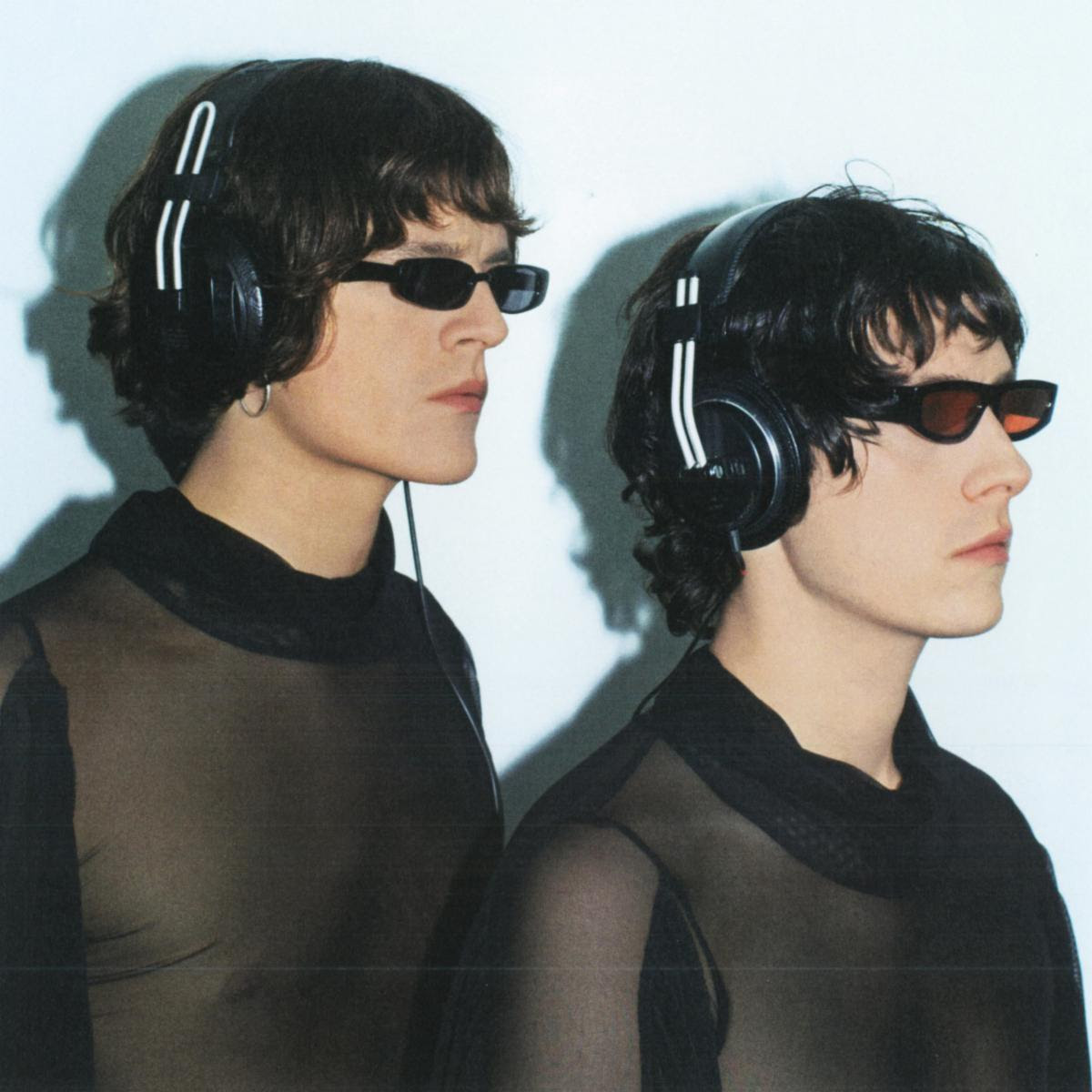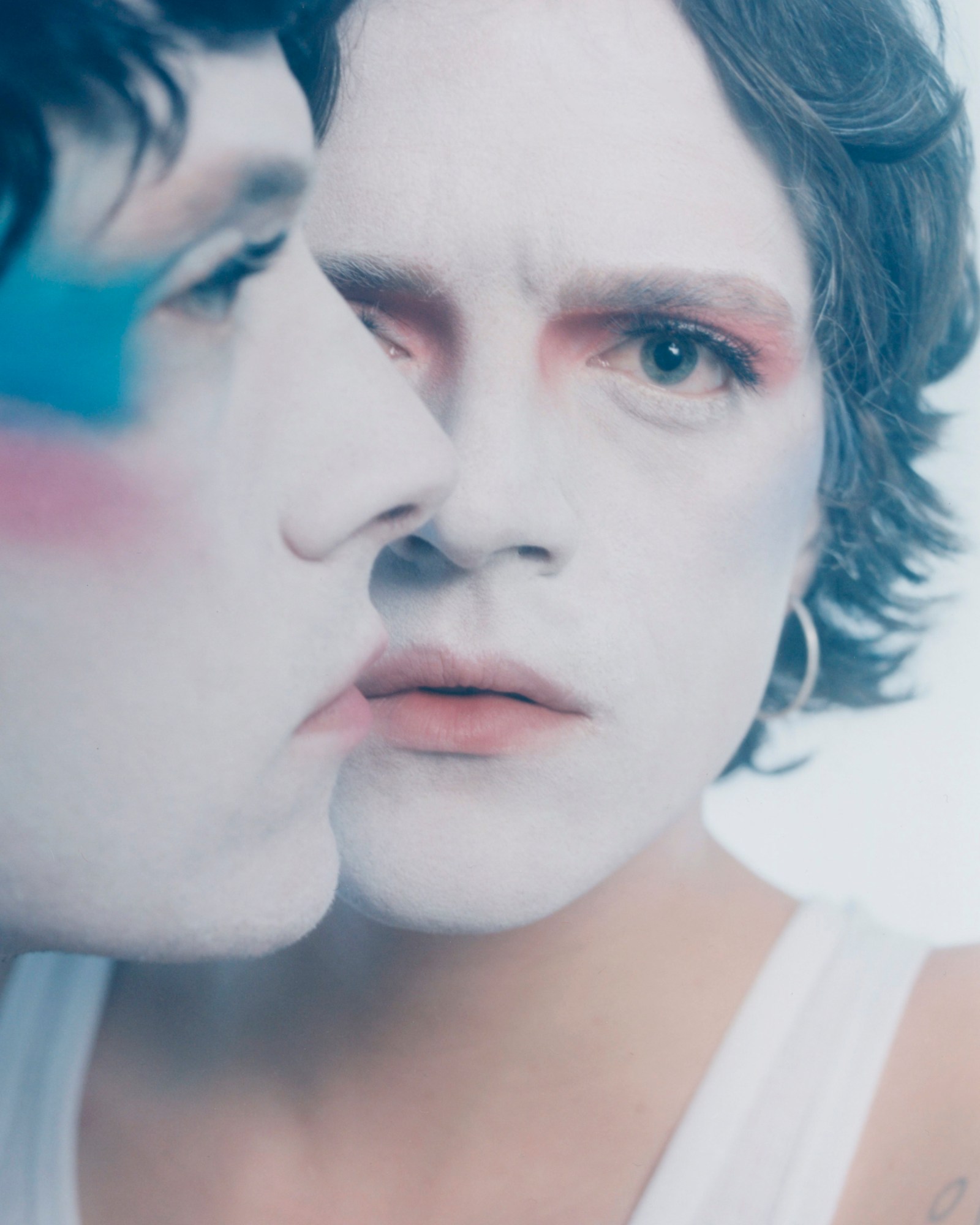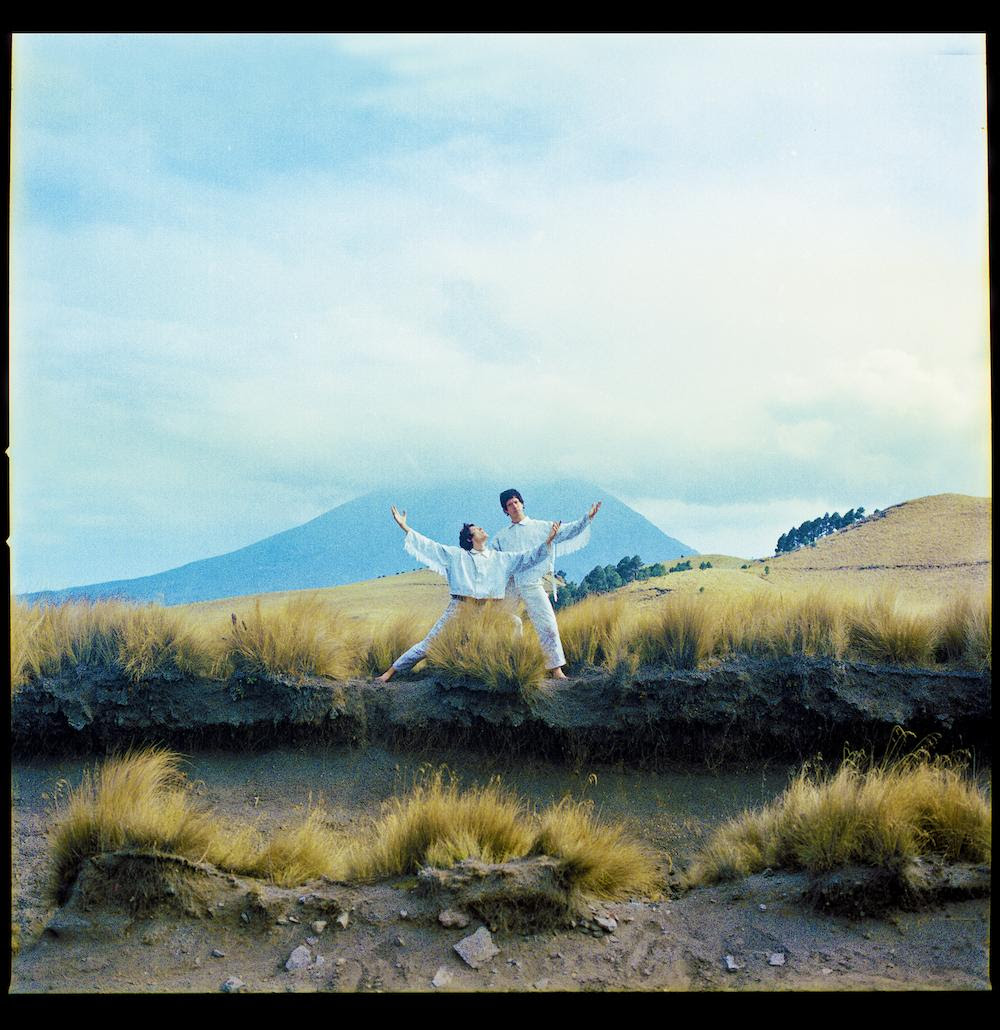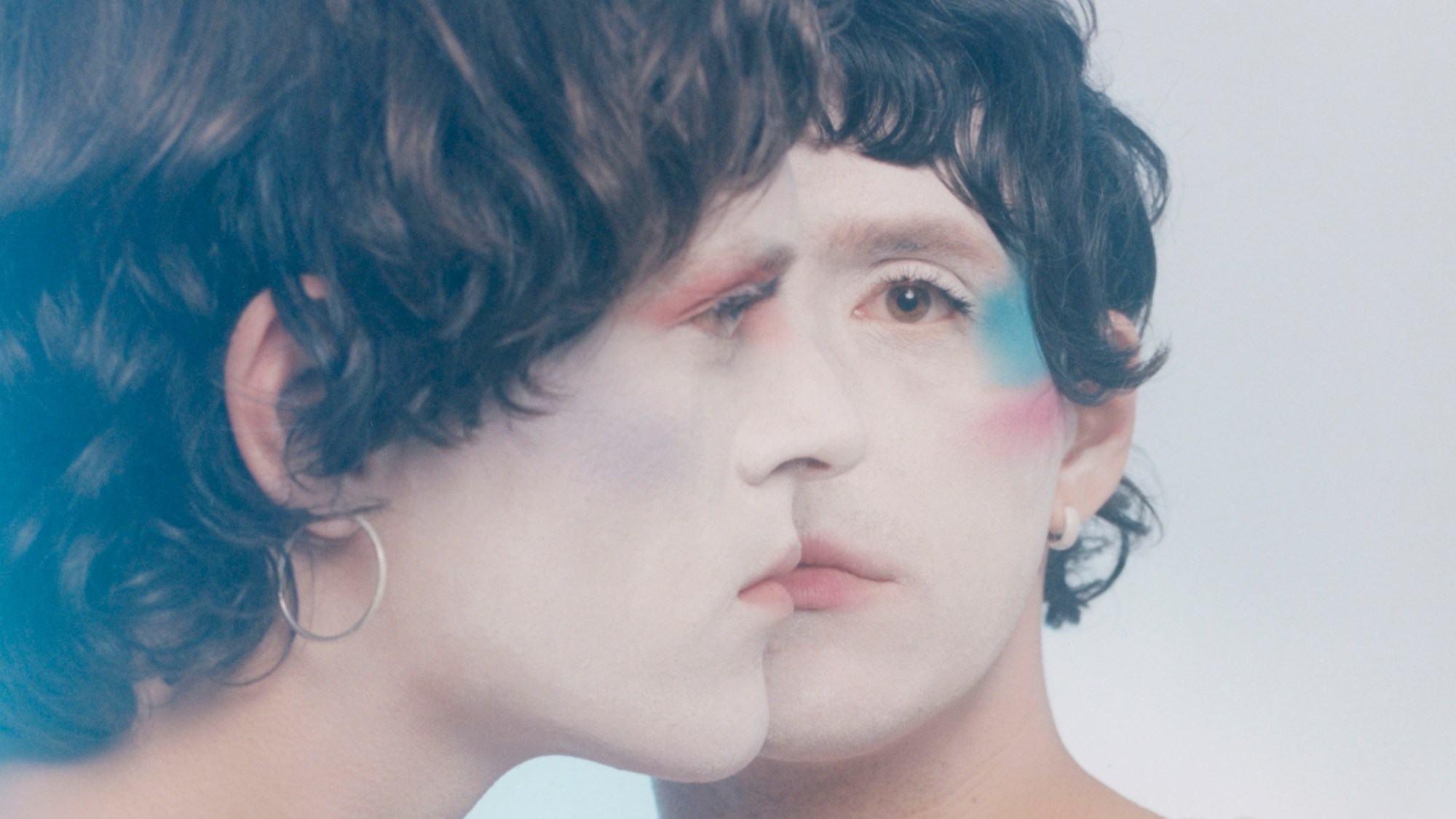“Our music is like a disease,” says Virgile Arndt, one half of Franco-American anti-rock duo Faux Real with brother Elliot. “The concept of ‘faux realism’ is constantly evolving because we’re still defining its borders — as brothers, we’ve grown up listening to the same music, seeing the same art, watching a lot of the same movies… it molded the way we think and perform organically.”
Watching Faux Real perform is a deeply cathartic experience, one that fuses the sound and aesthetic of disco with the chaos of a punk show. The avant-garde musicians jump barefoot into the crowd, dance, take their shirts off and recite guttural poetry in Frenglish. The whole affair proves an exercise in stretching the bounds of DIY performance and rejecting any norms of what one might expect at an indie show. Their eponymous debut is a fusion of art rock, disco and melancholic synth pop with Tame Impala producer Jay Watson’s seal of approval. It’s an isolated, active sound that cuts through the noise — and that’s exactly what they were looking to make.
The Arndt brothers have moved around the underground scenes of Europe, the US and Latin America with a shoestring budget and an ambitious aesthetic experience. If Mick Jagger was cloned and two of these clones went rogue and became romantic bards who spent too much time in Parisian nightclubs, it would be Faux Real. Before the release of their eponymous debut EP, i-D called them up the duo to talk about their life as a DIY duo on the road, and the philosophical disease of “Faux Realism.”

Did you guys grow up in France or the US?
Virgile Arndt: We grew up around Europe, moving around a bit as kids. Our aesthetics are heavily influenced by post-punk and new wave. There’s a common ground in high concept, lo-fi music from the 80s, that’s a very potent strain in our fabrication of this new disease.
I like that you call it a disease.
VA: Well, it’s not a fuckin’ art movement!
How do your underground European audiences compare to the scene in the US?
Elliot Arndt: We did the very first shows in Paris, about a year and a half ago. Paris crowds are Paris crowds; they’re hard to please, but they have a sharp ear. We did the first couple shows there and people were pretty psyched, so we took our act to London, which was exciting because of the English-speaking audience. There’s a theatrical side to our performance: the lyrics feed into the choreography. It’s another level when people can understand you, but even without that people are just feeding off the energy. At the end of the day, what we do is kind of kooky because people don’t associate a punky sound to an MTV choreography approach, so there’s that element of surprise.
VA: We started noticing this pattern, when we play in front of crowds that aren’t there to see us, support shows or whatever, the first two songs… the change in people’s faces in the front row goes from shock to disgust to arousal and then by the third song, they’re taking their tops off and getting freaky.
Can you talk about the story that this EP tells? The first couple singles, “Second Sweat” and “Boss Sweet”, show two very divergent sides of yourselves while “Kindred Spirit” synthesizes the two.
VA: There’s a couple of guests on the EP; Jay Watson, who’s produced for Tame Impala and did some of the drums and synths. We kept a lot of the demo materials, which were entirely produced, written, arranged and performed by us. We kind of divide up the musical components according to who’s better at what.
EA: The EP tells the story of the inception of “faux realism.” We draw from our own lives and obsessions and fears. “Second Sweat” is about having panic attacks at a restaurant. “Boss Sweet” is a love song, but the lover is another love song.
What’s the song?
VA: We went traveling through Myanmar a couple of years ago. They have a very set formula in pop music. This one song kept popping up on the radio and we literally spent our whole trip trying to follow it.
EA: We never actually got the title.
VA: We had so many leads cause we kept showing it to people. We recorded it on our phones when it would play in public places and we’d go into music shops and ask around. People kept telling us different things, and everything we looked up was not that song. During our very first writing session, the one that “Kindred Spirit,” “Come Thru” and “Boss Sweet” came out of, we kept listening to our iPhone memo of this song.

I remember the first time I saw you guys and aside from being this wild show, there’s also an isolated aspect because you don’t really see a show like that in the underground indie scene. This song specifically has both of those aspects, the bizarre and the solitary.
VA: We’ve been keeping things very incestuous for this first EP. It’s because we’re doing everything ourselves, but it’s something that comes through in the performance. There’s a playful fetishization of our brotherhood and it’s something we play upon. It’s a big part of the look and the vibe and the music. We built on a lifetime of weird sort of inside jokes, but this is actually who we are profoundly and our art needs to reflect that.
EA: That truth is how you’re gonna infect people. That’s how people will say “whatever the fuck this is, I need that.” We’re always planting seeds, fucking around with a turn of phrase or play on words, the band name, the costume, the concept of kinship and brotherhood… we’re the students of this thing.
Can you tell me more about your very distinctive look? The white matching outfits, the performing barefoot, shirtless and jumping into the crowd… these are things, if one has seen you before, that one comes to expect.
VA: We set out to perform these songs in a way that is fun for us and the audience, but that reflects the musicality, as we’re musicians first and foremost. The costumes just sort of happened… we wondered what we could do to fuck with the code of rock n’ roll, something alien. Most of our looks just come from the hardware store.
The chains too?
EA: Hardware store. Even the actual outfits! We found these gigantic boiler suits that were like $3 each, and we decided to just match and style it and do some weird shit. Then we wanted fringe, so we went to the curtain store. We were at our mum’s place in Paris and she helped us. We cut the suits in half because they wouldn’t be good for the dance moves. And then we decided on no shoes.
Have you ever stepped on anything that you shouldn’t have when you were performing?
VA: Every. Fucking. Time. We played a show at Tenants of the Trees in LA, and I was in the bathroom changing and there was blood everywhere! I had stepped on so much glass. We played a show in Austin at the Historic Scoot Inn and it’s an outdoor venue with a gravel floor… we were just kicking around in gravel. Every show has its own specific set of issues and virtues.
What’s the most memorable show you’ve played?
VA: Our show in Mexico was one for the books. We played at the birthday celebration of the Teatro Lucido, which works with a surrealist theater troupe. So, we went into the theater the day before the show to rehearse. We extended our set and they had 20 actors hiding in the crowd come out.
EA: They each picked one particular sentence from Dadaist literature that they whispered to the crowd and had cans of artificial foam that erupted into the audience. They came onstage and danced around us chanting and it was like one of those moments that you plan, you sort of rehearse and you’re like, “okay it’s gonna be cool,” but you don’t really know until it happens, yeah, when it happens… pretty cool.

What’s it like traveling as a DIY duo? I feel like it’s easier because it’s a small operation.
VA: After our first session, we were traveling through France and we had all our equipment in the back of a car. We began to fantasize about taking this everywhere. The set up was so portable, we decided to perform in a way where we can just pop up. You cannot work with a band until you’re like making good money and a couple records in. We’re trying to be a mirror to the industry and the state of what it is to be a band these days. You have to be inventive and minimal and fucking lucky and hopefully that catches on. We don’t have homes right now and are kind of just living it… it’s a reflection of the dire state of things.
EV: We’ve always had this romantic vision of what we’re doing. We feel like medieval performers going from village to village bringing their freak show with them.
